|
|
|
Sort Order |
|
|
|
Items / Page
|
|
|
|
|
|
|
| Srl | Item |
| 1 |
ID:
133995
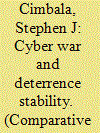

|
|
|
|
|
| Publication |
2014.
|
| Summary/Abstract |
Nuclear deterrence and cyber war are often discussed as separate worlds of research and military-strategic practice. To the contrary, a certain degree of overlap between nuclear deterrence and cyber conflicts is a plausible expectation for several reasons. First, future deterrent challenges will include regional nuclear arms races accompanied by competition in information technology and other aspects of advanced conventional command-control and precision strike systems. Second, cyber-attacks may be used against opposed nuclear command-control systems and weapons platforms as well as against infrastructure for the purpose of mass disruption during a crisis or war. Third, cyber capabilities support escalation dominance or escalation control, depending on the objectives of states and on the transparency of identification for cyber friends and foes.
|
|
|
|
|
|
|
|
|
|
|
|
|
|
|
|
| 2 |
ID:
133992
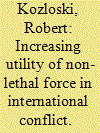

|
|
|
|
|
| Publication |
2014.
|
| Summary/Abstract |
Since the end of the Cold War, the United States has attained mixed results using the traditional instruments of power in pursuit of foreign policy objectives. In the future these instruments may prove even less effective because of domestic problems and changes in the geopolitical environment. Advanced military capabilities enabled by emerging technology may provide policymakers with broader options and greater utility when coercion is required in international relations. The application of non-lethal force is not a substitute for war but an effective lever to consider in future conflict. This article proposes several concepts: digital blockade, conflict termination, wide-area denial, and offshore control, which could be used during future state-level conflict. While these emerging capabilities offer great promise, they are not a panacea. Policymakers and military leaders must fully understand the conditions in which these capabilities provide maximum effectiveness, as well as overcoming legal barriers and contending with the problem of escalation.
|
|
|
|
|
|
|
|
|
|
|
|
|
|
|
|
| 3 |
ID:
133990
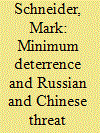

|
|
|
|
|
| Publication |
2014.
|
| Summary/Abstract |
Minimum Deterrence advocates, such as the Global ZERO report chaired by retired General James Cartwright, often urge the elimination of the U.S. triad of ICBMs, SLBMs, and bombers and minimum modernization of U.S. nuclear forces. These recommendations ignore fundamental realities. Both Russia and China have announced that they intend to increase their nuclear forces and both are modernizing their forces. Russia and China regard the U.S. as their main enemy and are arming against us. The Minimum Deterrence assumption that there is no risk of a conflict between the U.S. and Russia or China is a dangerous one. Both Russia and China have significant territorial claims against their neighbors. Russian claims to the Arctic Ocean and Chinese claims over the South China Sea are particularly troubling. China continues to threaten war over Taiwan. China has increasingly used military might to support its territorial claims in the South China Sea, creating incidents that have the potential to escalate into war. The most fundamental problem with Minimum Deterrence is that it intentionally degrades our deterrence of nuclear or other WMD attack, as well as our ability to deter nuclear escalation in a situation where the U.S. provides allies a credible nuclear umbrella. U.S. failure to provide a credible nuclear umbrella could result in Japan and, possibly other nations, deciding to go nuclear in order to protect themselves.
|
|
|
|
|
|
|
|
|
|
|
|
|
|
|
|
| 4 |
ID:
133996
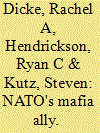

|
|
|
|
|
| Publication |
2014.
|
| Summary/Abstract |
By a number of accounts, NATO's membership expansion has been viewed favorably, with many analysts pointing to the positive impact NATO's enlargement has on the democratic development of civil-military relations across Central and Eastern Europe. Within this context, Mosès Naím's recent essay in Foreign Affairs was especially striking due to his piercing criticism of Bulgaria due to its significant problems with internal domestic corruption. We examine the potential impact of a Bulgarian mafia-oriented society on NATO from three perspectives, which include assessments of Bulgaria's military, its military capabilities-including its recent weapons purchases-as well as its willingness and ability to participate in NATO's major operations. In our view, these measures provide at least a partial assessment of Bulgaria's role within the alliance in an era that parallels claims of widespread corruption. The findings suggest that Bulgaria's corruption does have some impact on its ability to contribute to NATO's major alliance objectives, which apart from the deleterious impact on Bulgaria, also has broader implications for NATO's ongoing interest in membership expansion.
|
|
|
|
|
|
|
|
|
|
|
|
|
|
|
|
| 5 |
ID:
133994
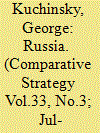

|
|
|
|
|
| Publication |
2014.
|
| Summary/Abstract |
Russia's current system of government is weakening. Putin's annexation of Crimea only masks this underlying trend. The system remains centered around Putin. Putin has effectively eliminated individual and institutional political rivals. But public criticism has become more diffuse and hard to neutralize. The impact of public opinion on driving the political process is growing and the opposition is expanding and coalescing. This is manifested through multifaceted forms of dissent and the growing influence of opposition leader Aleksey Navalniy. The dissent, which was initially fueled by prominent opinion makers, evolved into sporadic protests in key urban centers and political campaigns. Why did people who used to support Putin or were apathetic become critical to the point of speaking out and even engaging in opposition activity? The most likely catalyst was the 2008-2009 financial crisis. It undermined Putin's longstanding argument that an authoritarian system, with him at the helm, was necessary for economic advancement. Beyond economics alone, resentment is driven more generally by state incapacity-incapacity to strengthen the social safety net, improve public services, and effectively address corruption; violent crime; natural disasters; and terrorism-which increasingly contrasts Putin's stability narrative. Credible estimates and public perceptions indicate that corruption levels today exceed even those of the turbulent 1990's. Russia's leadership is known to be the key driver and beneficiary of this trend, which is also an important component that fuels discontent. The opposition has not organized into a political party and the government temporarily bolstered its popularity through outside intervention. This makes it hard for the opposition to dislodge Putin and for Putin to contain the opposition, which is creating an impasse. Russia is likely to be increasingly characterized by volatility-internally and on the international stage. This volatility positions the U.S. and the European Union to have greater influence on Russia but it's important for the West to understand how to take advantage of its already substantial leverage.
|
|
|
|
|
|
|
|
|
|
|
|
|
|
|
|
| 6 |
ID:
133991


|
|
|
|
|
| Publication |
2014.
|
| Summary/Abstract |
Russia's policy toward Afghanistan is at a critical juncture. This article aims to explain the evolution of Moscow's policy since 2001, and to assess its future options. The findings of this article are twofold. Moscow attempted to balance two overarching objectives: stabilize Afghanistan and maintain Russia's hegemony in Central Asia. Russian fluctuations toward Afghanistan since 2001 stemmed from changes in its perceived interests and its prioritization of these two objectives. Furthermore, Moscow is becoming increasingly concerned about Afghanistan. However, it has relatively few realistic policy options to address challenges that may develop once international military forces cease major combat operations.
|
|
|
|
|
|
|
|
|
|
|
|
|
|
|
|
| 7 |
ID:
133993
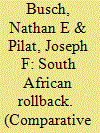

|
|
|
|
|
| Publication |
2014.
|
| Summary/Abstract |
As the only country in history to have created, then voluntarily renounced, a nuclear arsenal, South Africa is often referenced as a potential model for nuclear disarmament. However, this article argues that there are sharp limitations on the extent to which the South African case can be applied as a model for other countries to follow. Because South Africa unilaterally dismantled its program and only brought in inspectors from the International Atomic Energy Agency (IAEA) and key member states after the dismantlement was complete, information vital to the verification process was lost to the international community. As a model of a cooperative verification, South Africa thus highlights both the difficulties that monitoring and verification regimes will encounter, as well as the opportunities that they afford.
|
|
|
|
|
|
|
|
|
|
|
|
|
|
|
|
|
|
|
|
|